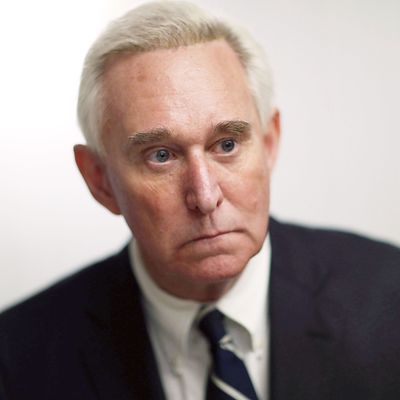
This weekend, the Washington Post reported that Roger Stone met in May 2016 with a Russian man offering to sell the Trump campaign damaging information on Hillary Clinton. There’s no evidence that Stone consummated the transaction. But there is plenty of significance in the revelation.
The first is that the story confirms Stone’s functionally active status as a surrogate for the Trump campaign. Stone officially left his role in August 2015. But he continued to speak regularly with Trump, while supporting him fervently. There is abundant evidence that Stone communicated privately with WikiLeaks during the campaign.
Stone turned down the latest offer because, as he told fellow Trump adviser Michael Caputo at the time, the self-styled Russian intermediary was demanding too much money in return for goods that seemed to promise little. He turned the deal down because it was a bad deal, and claims he now believes the man was an FBI planting trying to entrap him, but there is no dispute he was negotiating on Trump’s behalf. This tells us that any contacts Stone had with WikiLeaks were also done in his unofficial capacity as Trump surrogate. Stone was colluding with the publicity arm of Russian intelligence as a functional member of the Trump campaign.
Second, it matters that Stone and Caputo have been caught in another lie. Both men told congressional investigators they had no contact with Russians or people identifying themselves as Russian. “I’ve never been to Russia. I didn’t talk to anybody who was identifiably Russian during the two-year run-up to this campaign,” he explained to the Washington Post. “I very definitely can’t think of anybody who might have been a Russian without my knowledge.”
Stone now says he forgot all about this meeting. “I just didn’t remember, 2016 was a pretty busy year,” he tells ABC. It would be fairly surprising for Stone to have forgotten all about an approach from a Russian man offering dirt on Clinton given that Stone says he had zero contacts with Russians. You never forget your first time, as they say. It would be plausible that he forgot this contact with the Russians if he had a lot of contacts with Russians. Even if Stone’s unsupported charge that he was being set up is true, it would not explain why he failed to disclose the meeting and lied about it. In either case, “I forgot” is not usually a compelling defense against charges of perjury.
And the broader point is that Trump and his campaign keep lying, over and over, about the extent of their contacts with Russia. It is conceivable that one or two members of Trump’s campaign might forget an incidental contact with a purported Russian agent, especially if that person had a legitimate role as well. But the scores of lies tell us something different. They are not coming clean in the belief they did nothing wrong. They are denying everything, and when their lies are disproven, they simply retreat to a new categorical defense, and keep doing it. At every moment they insist that the only Russian contacts that occurred are the ones publicly known, but the list just keeps growing. The assumption that the list of known contacts is the entire list rests upon an assumption of innocence that, at some point we long ago passed, is forfeit.






























